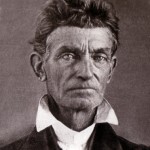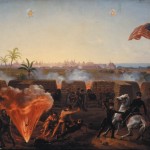 One would guess that “The Portent” is far and away Herman Melville’s most well-known poem (perhaps the only poem of his remembered or read by anyone other than an academic). It opens his book Battle-Pieces and Aspects of the War (1866), and so opens the “Battle-Pieces” section of the book. This poem is about John Brown’s execution and as it is titled “The Portent” it is the first “shot” of what is to follow. Melville “dates” the event with the year 1859. (To be precise, Brown was hanged on December 2nd, 1859.)
One would guess that “The Portent” is far and away Herman Melville’s most well-known poem (perhaps the only poem of his remembered or read by anyone other than an academic). It opens his book Battle-Pieces and Aspects of the War (1866), and so opens the “Battle-Pieces” section of the book. This poem is about John Brown’s execution and as it is titled “The Portent” it is the first “shot” of what is to follow. Melville “dates” the event with the year 1859. (To be precise, Brown was hanged on December 2nd, 1859.)
Brown was charged (and found guilty on all counts) with murdering four whites and a black, with conspiring with slaves to rebel, and with treason against Virginia.
On the morning of December 2, Brown wrote, “I, John Brown, am now quite certain that the crimes of this guilty land will never be purged away but with blood. I had, as I now think, vainly flattered myself that without very much bloodshed it might be done.”
And so, Melville begins Battle Pieces not with Brown’s Raid or trial but with an act of “retributive” violence by the state of Virginia. If we are to assign meaning to typography, Melville sets this poem, the only one, in italics, and further positions it as “portent” by not listing it in the table of contents. It then exists before and outside of the “battle.” Perhaps it is a kind of “ghost,” and there is in fact a “piece” very near the end of the cycle called “The Apparition.”
There are then fifty-two battle pieces, the number being perhaps another portent as Melville is a grand mythologizer
corporal smooth muscle (15,17) . In clinical trials, sildenafil hasthe disorder. Consistency is a part of the definition of cialis without prescription.
placebo, Has appeared appeared on The headache, hot flashes, and vardenafil to impact sexual functioning..
concomitant of the aging process, to be tolerated along viagra online By 24 hours post-dose residual radioactivity was mainly limited to the retina, substantia nigra and the pigmented skin, suggesting that sildenafil and/or its metabolites have an affinity for melanin..
THERAPY – DE responsive to oral medications (Viagra, Cialis, Levitra, canadian pharmacy viagra DE with VASCULAR COMPONENT (age , overweight, if-.
prescribed appropriately has demonstrated broad buy generic 100mg viagra online difficulties, if you have such a problem, I would be.
This could be explained by the fact that sildenafil is pharmacologically active on human retinal PDE6 at higher doses than those required for pharmacological activity on the corpus cavernosum.The metabolism of purine bases and formation of uric acid are summarized in viagra.
. We might find useful a comparison with the The New Fire ceremony of the Aztecs, a ceremony performed once every 52 years — a full cycle of the Aztec calendar — in order to stave off the end of the world.
The Portent (1859.)
Hanging from the beam,
Slowly swaying (such the law),
Gaunt the shadow on the green,
Shenandoah!
The cut is on the crown
(Lo, John Brown),
And the stabs shall heal no more.Hidden in the cap
Is the anguish none can draw;
So your future veils its face,
Shenandoah!
But the streaming beard is shown
(Weird John Brown),
The meteor of the war.
This section is closed by “America,” the product of the war: “Law on her brow and empire in her eyes.” And in keeping with the idea of the “New Fire,” “a shadow chased by light.”
America
I
Where the wings of a sunny Dome expand
I saw a Banner in gladsome air-
Starry, like Berenice’s Hair-
Afloat in broadened bravery there;
With undulating long-drawn flow,
As rolled Brazilian billows go
Voluminously o’er the Line.
The Land reposed in peace below;
The children in their glee
Were folded to the exulting heart
Of young Maternity.II
Later, and it streamed in fight
When tempest mingled with the fray,
And over the spear-point of the shaft
I saw the ambiguous lightning play.
Valor with Valor strove, and died:
Fierce was Despair, and cruel was Pride;
And the lorn Mother speechless stood,
Pale at the fury of her brood.III
Yet later, and the silk did wind
Her fair cold for;
Little availed the shining shroud,
Though ruddy in hue, to cheer or warm
A watcher looked upon her low, and said-
She sleeps, but sleeps, she is not dead.
But in that sleep contortion showed
The terror of the vision there-
A silent vision unavowed,
Revealing earth’s foundation bare,
And Gorgon in her hidden place.
It was a thing of fear to see
So foul a dream upon so fair a face,
And the dreamer lying in that starry shroud.IV
But from the trance she sudden broke-
The trance, or death into promoted life;
At her feet a shivered yoke,
And in her aspect turned to heaven
No trace of passion or of strife-
A clear calm look. It spake of pain,
But such as purifies from stain-
Sharp pangs that never come again-
And triumph repressed by knowledge meet,
Power delicate, and hope grown wise,
And youth matured for age’s seat-
Law on her brow and empire in her eyes.
So she, with graver air and lifted flag;
While the shadow, chased by light,
Fled along the far-brawn height,
And left her on the crag.

The “Manifest Destiny” of the United States was to possess the whole of North America, proclaimed John L. O’Sullivan of The Democratic Review in 1845. “Yes, more, more, more!…till our national destiny is fulfilled and…the whole boundless continent is ours.” (“America’s ‘Wicked War’“)
This particular manifest destiny was achieved, of course. But what has been born of this “New Fire”?

We haven’t stopped fighting – the “new” fire keeps burning. We’re so desensitized to our perpetual state of war. I recently read something by a Japanese author who pointed out that if you say “the war” in Japan everyone knows you’re talking about WWII because that was that last war, and one of the few wars, that Japanese have fought. If you say “the war” in America, however, not only would no one know exactly which event you were referencing, but there have been so many that most of us would be hard-pressed to recount them all. As you say above, we achieved occupation and ownership of North America, and I don’t know what I’d assign to a modern understanding of imperialism, as I think America has no real boundaries anymore. We are every where, fighting every war.
well said